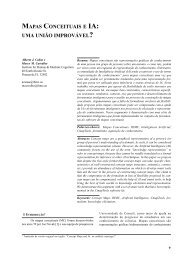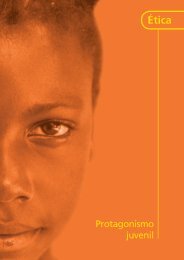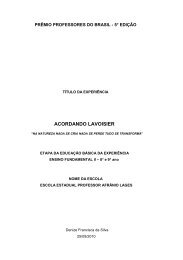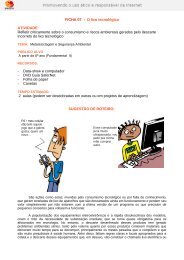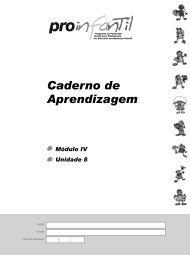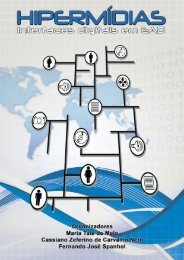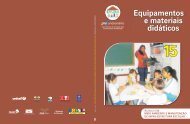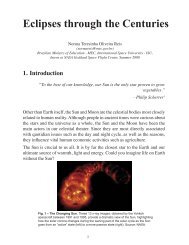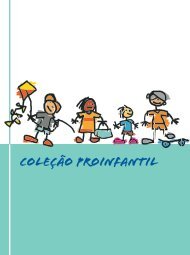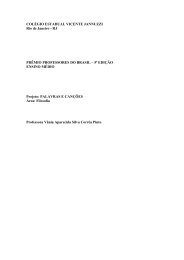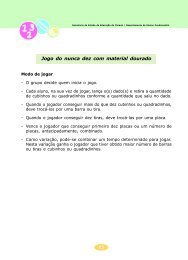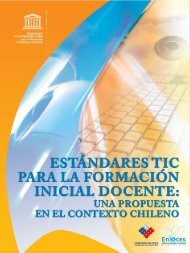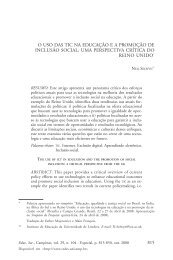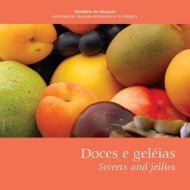BIO-CULTURAL COMMUNITY PROTOCOLS - Portal do Professor
BIO-CULTURAL COMMUNITY PROTOCOLS - Portal do Professor
BIO-CULTURAL COMMUNITY PROTOCOLS - Portal do Professor
You also want an ePaper? Increase the reach of your titles
YUMPU automatically turns print PDFs into web optimized ePapers that Google loves.
PART I / CHAPTER 2<br />
Our bio-spirituality is rooted in a relationship with nature<br />
that is both intimate and sacred. We experience a deep sense<br />
of kinship with the plants and animals and treat nature with<br />
love and respect. Our knowledge, dreams and intuitions, all of<br />
which are crucial for healing, are based on our ability to see<br />
ourselves integrally connected to nature, not separate from it. 11<br />
The Vaidyas from the Malayali Hills in Tamil Nadu, India, also<br />
expressed their spiritual understanding of nature and explained<br />
how their beliefs lead them to harvest sustainably. They state:<br />
We believe that plants are sacred and the effectiveness of our<br />
plant-based medicines is integrally linked to us respecting the<br />
plants and caring for them.<br />
We have a specific way of collecting our medicinal plants.<br />
We collect them in the early morning on Tuesdays, Fridays<br />
and Sundays, or during the full moon. We find that the<br />
curative properties of the plants are at their peak when they<br />
are collected at dawn. The day before we collect the plant, we<br />
pray to the plant and we tie a thread that has been dipped<br />
in Turmeric around the plant. The next day we chant a<br />
mantra up to 108 times before harvesting, using only our<br />
thumb and little fingers to pick the leaves and fruit to ensure<br />
that we cause as little harm to the plant as possible.<br />
One of the mantras we chant is: om mooli, maha mooli, jeeva<br />
mooli, un uver, un udalilinirka, swaha which is translated from<br />
Sanskrit as: ‘O great living plant, let your life stay in you’.<br />
We only take roots and bark when absolutely necessary.<br />
Respecting the plant and reciting mantras leads to<br />
efficacious medicines. We also never touch the plant with<br />
our feet as that conveys disrespect. We also believe that<br />
a plant has the power to curse you if it is abused.<br />
It is a power en<strong>do</strong>wed to plants by the first teacher (Siddha)<br />
of the Siddha system of medicine, Sage Agasthya. We <strong>do</strong> not<br />
harvest the medicinal plants to sell at the markets but we<br />
collect them primarily for our own healing practices. 12<br />
3.5 Types of Traditional Knowledge<br />
As noted in chapter I and as stated in Article 8(j), TK is a<br />
conglomeration of ILCs’ knowledge, innovations and practices.<br />
The communities whose BCPs are referenced above confirmed<br />
this and made a distinction between different types of<br />
<strong>BIO</strong>-<strong>CULTURAL</strong> <strong>COMMUNITY</strong> <strong>PROTOCOLS</strong> AS A<br />
<strong>COMMUNITY</strong>-BASED RESPONSE TO THE CBD<br />
knowledge, including ethno-veterinary knowledge, breeding<br />
practices, ecological knowledge, and knowledge about the<br />
use of plants to heal people. The Samburu communities spoke<br />
at most length of the first three types of knowledge:<br />
Our traditional knowledge has developed over time and<br />
continues to evolve as we face new challenges. We have three<br />
broad types of traditional knowledge: ethno-veterinary<br />
knowledge, breeding practices and an understanding of the<br />
ecology of the region that allows us to find water and grazing<br />
for our animals. Notably, these different types of knowledge<br />
are interdependent.<br />
Ethno-veterinary knowledge: We have for centuries treated<br />
our animals for diseases and other ailments using our<br />
knowledge of the medicinal plants that grow on the plains<br />
and in the forests. While we share common knowledge, we<br />
have specializations among us. For example, men generally<br />
treat cows, and women care for sheep. Women’s knowledge<br />
is focused on treating Red Maasai sheep and is less adapted<br />
to treating Dorper sheep. We also have traditional knowledge<br />
relating to treating infants and adults for a range of ailments.<br />
Each generation receives the earlier generation’s knowledge<br />
and further develops it to tackle new challenges and according<br />
to each individual’s skill as a healer.<br />
Breeding practices: Because of the conditions in which we<br />
live, we carefully breed our animals so as to ensure that they<br />
suit our needs and preferences. We employ a number of<br />
methods, including choosing breeding bulls and rams by<br />
judging the mother’s ability to withstand drought, her color,<br />
size, activity levels and the survival rate of the offspring. We<br />
also maintain our herds’ and flocks’ diversity by buying<br />
animals from our neighbors, or borrowing them. For example,<br />
when sharing rams, the agreement is based on the principle<br />
of reciprocity. If close by, we will provide it on the basis that<br />
the favor will be returned. If the trip is very far, then in the first<br />
instance we would send the animal with one other of our own<br />
herds and the pair will be returned together with another<br />
female animal as a gift.<br />
11. Bio-cultural community Protocol of the Traditional Health Practitioners of Bushbuckridge. For more information contact the Executive Committee of the Traditional<br />
Health Practitioners of Bushbuckridge, c/o Natural Justice: www.naturaljustice.org.za<br />
12. Bio-cultural Community Protocol of the Traditional Healers of the Malayali Tribes. For more information contact Tamil Nadu Paramparya Siddha Vaidya Maha Sangam,<br />
c/o the Foundation for Revitalization of Local Health Traditions: www.frlht.org<br />
26



